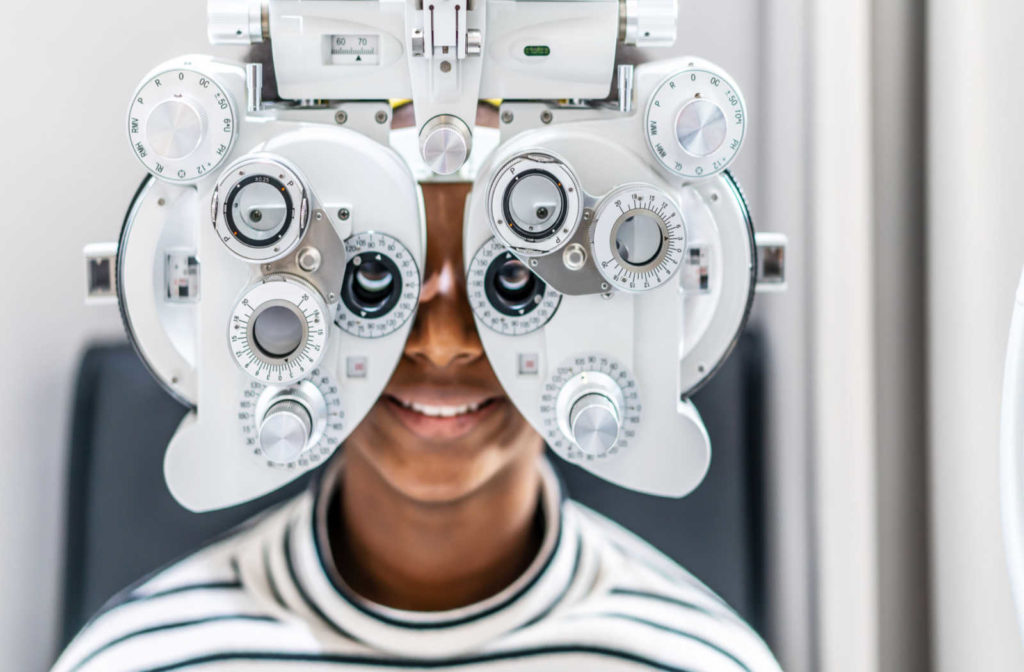Experience Personalized Care with Opticore Optometry in Chino
Wiki Article
The Importance of Regular Eye Tests and Exactly How an Eye Doctor Can Aid Maintain Your Vision
In today's fast-paced world, protecting our vision usually takes a rear seat to even more immediate problems, yet normal eye examinations are an essential part of keeping general health. As we explore the nuanced obligations of eye doctors, one might question exactly how these insights translate right into concrete benefits for long-lasting eye health.Advantages of Routine Eye Examinations

One of the main benefits of regular eye exams is the ability to keep track of adjustments in vision that may not be quickly noticeable. Eye tests can reveal systemic health and wellness issues.
Additionally, routine eye tests add to enhanced lifestyle. By ensuring ideal vision, individuals are better outfitted to carry out day-to-day tasks, enhancing productivity and minimizing the threat of accidents. Overall, the proactive method of normal eye exams fosters not just ocular health but likewise alternative well-being.
Early Detection of Eye Conditions
Along with the advantages of preserving visual skill and overall health, eye exams contribute in the very early discovery of different eye problems. Routine eye examinations permit the identification of illness that might absent symptoms in their first phases, such as glaucoma, diabetic person retinopathy, and age-related macular degeneration. Early discovery is critical since it enables prompt intervention, which can stop progression and minimize the risk of vision loss.
Age-related macular deterioration, a leading root cause of loss of sight amongst older grownups, can likewise be detected early through routine eye exams. By identifying drusen down payments or adjustments in the macula, optometrists can keep track of and take care of the problem proactively. Eventually, consistent eye assessments are essential for safeguarding vision and enhancing quality of life with early detection and treatment.
Role of Optometrists in Vision Care
Eye doctors play an essential role in vision care, serving as the key medical care experts devoted to the assessment, medical diagnosis, and monitoring of eye wellness. Their proficiency is vital in maintaining optimum aesthetic feature and total eye health, which is essential for a person's lifestyle (Opticore Optometry). Optometrists are thoroughly trained to identify a variety of eye conditions, from refractive mistakes such as myopia and hyperopia to extra intricate problems like glaucoma and macular degenerationWith extensive eye assessments, eye doctors assess both visual acuity and the health and wellness of the eyes, enabling early discovery and intervention for different ocular illness. This preventative method can dramatically decrease the risk of vision loss and various other complications. Furthermore, eye doctors are experienced concerning recommending rehabilitative lenses and recommending way of life or nutritional adjustments to support aesthetic health.
Along with their clinical duties, optometrists typically provide client education, encouraging individuals to take aggressive actions in preserving their eye health and wellness. They collaborate with other doctor when needed, ensuring a multidisciplinary approach to managing systemic problems that may affect vision, such as diabetes and hypertension. Hence, optometrists are crucial allies in safeguarding and Eye Doctor Optometrist improving aesthetic health and wellness throughout an individual's life.
Technologies Used in Eye Examinations
Developments in technology have considerably boosted the capacity of optometrists to deliver comprehensive eye treatment. Modern eye exams employ a variety of sophisticated devices to detect and keep an eye on ocular wellness precisely. Digital retinal imaging, as an example, allows eye doctors to record in-depth pictures of the retina, offering important insights right into problems such as diabetic person retinopathy and macular degeneration. This non-invasive strategy uses an extensive view of the retina, facilitating very early detection and i loved this intervention.Optical Comprehensibility Tomography (OCT) is another advanced innovation made use of in eye tests. OCT gives high-resolution cross-sectional photos of the retina, allowing specific evaluation of its layers. This is specifically important in detecting glaucoma and retinal conditions, where refined adjustments can have substantial effects for vision.
Additionally, automated refractors have streamlined the process of determining corrective lens prescriptions. These gadgets use advanced algorithms to measure refractive mistakes promptly and precisely, making sure optimal vision modification.
In addition, aesthetic field testing modern technology evaluates field of vision, important for finding glaucoma. This examination maps the client's visual area to recognize any deficits or blind places that can show underlying concerns.
Through these innovations, eye doctors can provide an extensive evaluation of eye wellness, ensuring effective and prompt treatment.
Keeping Vision Wellness in the house
Preservation of vision health starts with consistent treatment and interest to daily practices that sustain eye well-being. Make certain appropriate lighting while functioning or reading, as dark conditions can stress the eyes.A healthy diet regimen rich in nutrients such as vitamins A, Omega-3, e, and c fatty acids is essential for eye health and wellness (Eye Doctor). Foods such as leafy environment-friendlies, fish, nuts, and carrots can offer these vital nutrients. Staying moisturized is equally crucial, as it prevents completely dry eyes
Regular exercise can improve blood flow, adding positively to eye wellness. In addition, using sunglasses with UV defense shields your eyes from unsafe ultraviolet rays, minimizing the risk of cataracts and various other eye problems. Avoid smoking, as it is linked to a boosted danger of age-related macular deterioration and various other vision problems. By adopting these habits, individuals can improve their vision wellness in your home.
Conclusion
Routine eye exams are important for preserving vision and promoting eye wellness, permitting for the early detection of conditions such as glaucoma and diabetic retinopathy. By prioritizing regular eye examinations, individuals can much better secure see post their vision and address potential systemic health concerns properly.In today's hectic world, safeguarding our vision frequently takes a backseat to even more instant issues, yet regular eye tests are an important element of maintaining total health and wellness.In addition to the benefits of maintaining aesthetic skill and general health and wellness, eye exams are important in the early discovery of various eye conditions - Eye Doctor.Through comprehensive eye exams, optometrists assess both aesthetic acuity and the health and wellness of the eyes, allowing very early discovery and intervention for different eye diseases. Using sunglasses with UV defense shields your eyes from unsafe ultraviolet rays, decreasing the threat of cataracts and various other eye conditions.Routine eye tests are vital for preserving vision and promoting eye health and wellness, permitting for the early discovery of conditions such as glaucoma and diabetic retinopathy
Report this wiki page